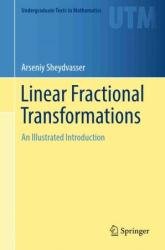Linear Fractional Transformations: An Illustrated Introduction
- Добавил: literator
- Дата: 19-04-2023, 06:15
- Комментариев: 0
 Название: Linear Fractional Transformations: An Illustrated Introduction
Название: Linear Fractional Transformations: An Illustrated IntroductionАвтор: Arseniy Sheydvasser
Издательство: Springer
Серия: Undergraduate Texts in Mathematics
Год: 2023
Страниц: 242
Язык: английский
Формат: pdf (true), epub
Размер: 52.6 MB
The principle aim of this unique text is to illuminate the beauty of the subject both with abstractions like proofs and mathematical text, and with visuals, such as abundant illustrations and diagrams. With few mathematical prerequisites, geometry is presented through the lens of linear fractional transformations. The exposition is motivational and the well-placed examples and exercises give students ample opportunity to pause and digest the material. The subject builds from the fundamentals of Euclidean geometry, to inversive geometry, and, finally, to hyperbolic geometry at the end. Throughout, the author aims to express the underlying philosophy behind the definitions and mathematical reasoning.
This text may be used as primary for an undergraduate geometry course or a freshman seminar in geometry, or as supplemental to instructors in their undergraduate courses in complex analysis, algebra, and number theory. There are elective courses that bring together seemingly disparate topics and this text would be a welcome accompaniment.
I wrote this book with the intention of fostering mathematical growth. The exercises in this book are written accordingly and are organized into sections at the end of each chapter. The difficulty of the exercises varies greatly: some are very simple continuations of proofs written out in the main text; others ask for proofs of entirely new results, but broken down into many steps to guide the reader through the process; still others ask for entirely new proofs without any guidance. Depending on the mathematical maturity of the reader, these exercises will range from essentially trivial to deeply challenging. Being unable to do all of the exercises should not be taken as a sign of defeat but as a chance for continued growth. I would recommend going through the exercises that cover some missing pieces in the exposition of the main text—these can be easily identified by the fact that they are cited as “(See Exercise xxx)” in the text. In particular, wherever a proof in the main text is left as an exercise to the reader, that is something that should be prioritized. On the other hand, for readers looking to avoid busywork, I recommend the following litmus test to decide whether you should skip a problem: when you look at it, is it obvious to you how to solve it? Do you understand it well enough that you could explain to another person how to do it? If the answer to both questions is an honest “yes”, then I think that skipping the exercise is permissible. If you are unsure, try to find a friend and explain to them your reasoning. If all of your friends are busy and/or don’t want to hear about math, a rubber duck will usually do in a pinch.
Contents:
Скачать Linear Fractional Transformations: An Illustrated Introduction
[related-news] [/related-news]
Внимание
Уважаемый посетитель, Вы зашли на сайт как незарегистрированный пользователь.
Мы рекомендуем Вам зарегистрироваться либо войти на сайт под своим именем.
Уважаемый посетитель, Вы зашли на сайт как незарегистрированный пользователь.
Мы рекомендуем Вам зарегистрироваться либо войти на сайт под своим именем.

